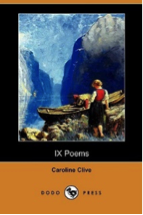 Caroline Clive was a 19th century English writer who produced a number of collections of poetry as well as a few novels. Her most famous poetic work was probably the book IX Poems which received a great deal of acclaim from Victorian literary critics when published in 1840 and was reissued several times afterwards. In 1855 she published a novel called Paul Ferroll which was unusual in that it was a sensational tale of a killer who murders his wife but written by a woman. This theme of the psychological drama was picked up by other authors who followed, examples being Wilkie Collins and Mary Elizabeth Bradden. It is believed that the majority of her work was published using the pseudonym “V”, a shortened version of “Vigolina” which was a nickname given to her by her future husband.
Caroline Clive was a 19th century English writer who produced a number of collections of poetry as well as a few novels. Her most famous poetic work was probably the book IX Poems which received a great deal of acclaim from Victorian literary critics when published in 1840 and was reissued several times afterwards. In 1855 she published a novel called Paul Ferroll which was unusual in that it was a sensational tale of a killer who murders his wife but written by a woman. This theme of the psychological drama was picked up by other authors who followed, examples being Wilkie Collins and Mary Elizabeth Bradden. It is believed that the majority of her work was published using the pseudonym “V”, a shortened version of “Vigolina” which was a nickname given to her by her future husband.
She was born Caroline Wigley on the 24th June 1801 in the fashionable London district of Brompton Road which is a part of the Royal Borough of Kensington and Chelsea and close to the famous Harrods store. Her father, Edmund, was a barrister and Whig Member of Parliament who originated from Worcestershire. Little is recorded about her early life but she grew up in a privileged environment, enjoying a decent education which included music, drawing, geography and languages such as Greek, French and Latin. She was handicapped though by the after effects of a childhood illness, believed to be infantile poliomyelitis, and both of her legs were partially paralysed meaning that she always had to walk with the aid of a stick.
The family name was changed to Meysey-Wigley when Caroline was ten years old, incorporating her mother’s maiden name of Meysey. She waited until the age of 39 to marry, her husband being the Reverend Archer Clive and they married in November 1840. She soon had two children, a boy and a girl. It was unusual in Victorian times to only have two children but this is all they had. Caroline settled down to married life and her career as a writer of poetry soon took off with her first collection IX Poems was very favourably reviewed in the Quarterly. It was, however, a relatively short career, having started late.
She will have, no doubt, created a great deal of controversy with her novel Paul Ferroll, published in 1855, along with a follow-up story which took the form of a “prequel” and was called Why Paul Ferroll Killed His Wife and was published five years later. The story involved a “ménage a trois” situation where Ferroll kills his wife in order to be with his true love and includes rather more emphasis on sexual violence and tensions than Victorian readerships will have been used to. They will have been even more shocked because the story came from the pen of a female author.
In contrast though her poetry often explored dreamy, romantic themes, examples being I Watched the Heavens (1842) and The Queen’s Ball (1847). Much of her work appeared in periodicals such as The National Magazine, The Cornhill Magazine and the Hereford Times. Clive ended her days in Herefordshire and all of this work was submitted anonymously. An example of her poetry is one entitled The Morlas which has the narrator of the piece speaking to the “spirit of the valley” about enlightenment, the natural cycle of love and death and historical changes that affect us all. In this small section the spirit says:

She wrote at least one play called A Minute Ago and submitted a number of articles with such titles as Vanity and Self-Esteem, which appeared in The New Monthly Belle Assemblée in 1847 and the unusually titled The Swimming School for Women at Paris, seen in Once A Week in 1859.
During her later years Mrs Clive’s invalidity meant that she no longer had the energy or need to write poetry any more. She was comfortably off and, therefore, made a conscious decision to abandon her various writing projects.
Caroline Clive died on the 13th July 1872, aged 71.

